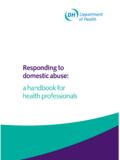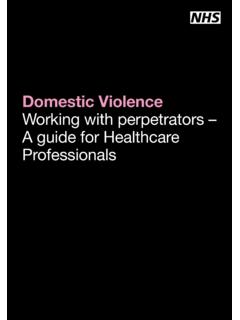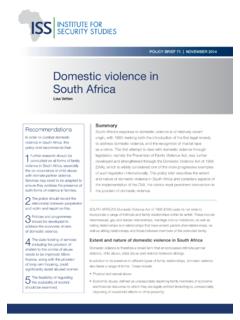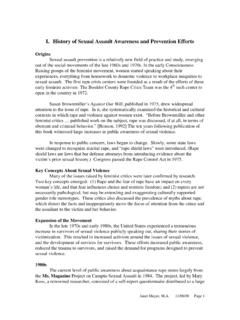Transcription of Domestic Violence A resource for trans people
1 Domestic Violence A resource for trans people Contents Acknowledgements ..i They love me, they love me not ' ..1. Why it can be hard to talk about Domestic abuse ..4. Am I being abused? ..6. Abuse from a former partner or family members ..10. Using someone's gender identity to abuse ..13. Myths about Domestic abuse that can make it ..16. difficult to get help About abusive relationships ..18. Domestic abuse affecting trans people from ..26. diverse communities trans young people ..28. trans parents and children.
2 31. Chronic illnesses, disability and Domestic abuse ..34. Ending the abuse ..36. What you can do to get help ..40. Computer safety warning ..42. About abusers ..44. For people using Violence and abuse ..46. Useful contacts ..49. Contents The Forum is a network of practitioners, activists ii Acknowledgements and researchers working around the issue of LGBT. Domestic abuse. Thanks are particularly due to James Rowlands without whom this leaflet would not have been possible as well as Maria Sookias, Jay Stewart, Denise Anderson, Joe, Jamey Fisher and Janice This resource has been written principally to assist Ristock for their contributions.
3 Trans1 people who experience Domestic abuse. NHS Barking and Dagenham ( ). While it may also be of use to family and friends, serves the population of Barking and Dagenham, an as well as service providers, we have assumed outer London borough with a population of around a certain level of knowledge about the trans 170,000 people . community. We hope it will be the first of a range of resources about Domestic abuse as it affects Barking and Dagenham was a demonstration site for trans people in London. Domestic Violence for the NHS in London in 2008, and launched the regional resource site While this is a new resource , we are indebted to the to help improve work of Barking and Dagenham PCT who originally the support provided by healthcare professionals to developed Domestic abuse resources for lesbian, gay individuals experiencing and affected by Domestic and bisexual men and women upon which we have Violence and abuse.
4 Drawn. This resource has been written and produced by two organisations: Most importantly of all, we want to acknowledge and express our gratitude to those who have contributed The Greater London Domestic Violence Project from their personal experience to help make this a ( ) is an independent charity that useful resource . works to end Violence by inspiring and influencing direct service providers, and through promoting partnerships and innovation. 1. trans ' is used in this resource as an umbrella term. It includes cross- dressers, transgender and transsexual people as well as anyone else who is in any way gender variant, including a desire to live outside male/.
5 As part of our work, we provide technical support to female binaries. This definition, as well as a more extensive description the LGBT Domestic Abuse Forum with whom we have of the meaning of sex' and gender', is taken from A Guide for Young trans people in the UK published by the Department of Health in 2007. collaborated with to produce this leaflet. available at: Acknowledgements Acknowledgements 1. They love me, they love me not . people experience Domestic abuse regardless of age, carer responsibility, class, disability, gender identity, sex, sexuality, immigration status, race and religion.
6 Domestic abuse is a pattern of behaviour characterised by the exercise of control by one person over another within the context of an intimate or family relationship. trans people can experience Domestic abuse from a same or opposite sex partner, and can do so regardless of the gender identity of either person. In some cases, abusers will use the process of coming out' or transition as an additional form of control. This can be particularly difficult where children are involved. trans people can also experience abuse from family members.
7 If someone experiences abuse from their family, this may occur after they have come out, during transition or when they enter into a relationship where either or both partners are trans . They love me, they love me not . Most people find Domestic abuse difficult to identify and 3. this is especially true if you are the one it is happening to. It can be very tempting to want to believe it was a one-off', or that it's just a bad patch, or is related to external events and factors. people sometimes misunderstand Domestic abuse and think it is only physical Violence when actually it usually consists of emotional, financial and/or sexual abuse as well.
8 Additionally, trans people often face heightened levels of abuse and Violence outside their homes because of transphobia2. Whilst it is devastating for anyone who faces abuse from a loved one, for trans people it can be especially traumatic because of a lack of safety elsewhere in their lives and the discrimination they may face if they seek help. Whatever your circumstances, if you are experiencing abuse, it is important to remember that: You are not alone You do not have to live in fear Help is available You do not deserve' to be abused Suicide or self harm is not the answer There is life after abuse 2.
9 Transphobia is a term used to describe an irrational feeling of fear or contempt towards transgender women and men, and could also describe discriminatory behaviours towards transgender people . They love me, they love me not . Abusers often promise to change their behaviour (see 5. Why it can be hard to talk about About Abusers'). The hope for that positive change Domestic abuse can keep a victim from identifying the pattern of abuse in the relationship. Abusers may also try to make their victim think they are responsible for any abusive behaviour (see About Abusive Relationships' later in this booklet).
10 It can be hard to name behaviours as abuse when For example, someone could be showing you this they are happening in a trans person's relationship. information to try and prove to you that you are an Talking about Domestic abuse in either intimate abuser. There is no checklist that can determine or family relationships is never easy. Often this is whether someone is an abuser; one needs to because people don't talk about Violence and abuse. consider the entire relationship and individual incidents in context. With abuse involving trans people there is so little information available that the idea of a current or former It is also important to recognise that in some partner, or a family member being the abuser' can be relationships a trans person may be the abuser.









